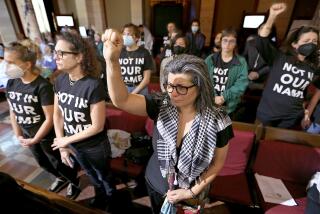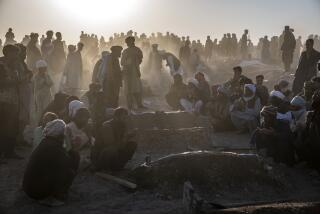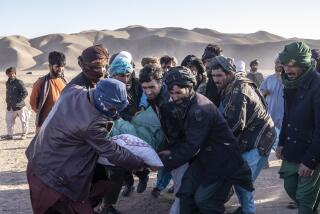Rifle Butt Still Speaks Loudly in Herat
- Share via
HERAT, Afghanistan — Testing their right to assemble under post-Taliban rule, about 250 people rallied here Wednesday outside the Blue Mosque in support of Afghanistan’s deposed king.
Their freedom of expression, ahead of this city’s first election in 23 years, was short-lived. A dozen moujahedeen fighters loyal to Northern Alliance Gen. Ismail Khan dispersed the crowd with harsh words and beatings, using the butts of their Kalashnikov assault rifles and RPG grenade launchers.
The charismatic ethnic Tajik general, meanwhile, delivered an impassioned speech inside the mosque to 150 “white beards,” as Afghan elders are called. He blasted former national leaders for relying on foreigners to run the country.
Supporters of the warlord, who controls this region of Afghanistan, then erased any doubts about his message. Throngs of his turbaned fighters drove through the city in trucks and buses, shouting slogans against the 87-year-old deposed monarch, Mohammad Zaher Shah.
One of the few people at the mosque who opted not to speak publicly Wednesday was Haji Abdul Rahmen Khosravi, a former English teacher who is running for mayor in today’s elections.
Khosravi, who estimates his age to be 45, said he has no campaign manager. Nor does he have placards or glossy advertisements to alert city residents to his candidacy. He also appeared confused about the concept of mudslinging.
“What I think about the other candidates? That’s difficult to say,” he answered uncomfortably, shaking his head.
“He doesn’t like to talk badly about other people,” explained his friend, Habibollah Omaniar.
Khosravi said he is running for office because he needs a job. His platform? More water, electricity and other city services.
About 250 representatives from various districts of the city will come to the mosque today to elect a mayor from among 13 candidates, election workers said. It’s a system based on Islamic principles, they added. Women will not be allowed to vote.
“There is no connection between women and mayoral politics,” said Omaniar, when asked why women were not taking part.
(In response to a reporter’s inquiry, Khan said he would try to include a female representative at today’s gathering to cast a vote on women’s behalf.)
The political events overshadowed other post-Taliban firsts Wednesday, such as women being allowed to use the city’s public showers, which for most residents are the only source of hot water for bathing.
Even the sound of explosions in the distance--Northern Alliance troops said they were testing weapons left behind by the Taliban--didn’t distract people from the demonstrations for and against Zaher Shah.
Herat intellectuals such as Mohammed Ali, who asked that his last name not be published, said Khan’s hurried effort to squelch support for the exiled monarch was due to pressure from Northern Alliance leader Burhanuddin Rabbani. Zaher Shah, who was deposed in 1973 after 40 years of rule, poses the greatest political threat to Rabbani, Afghanistan’s president when the Taliban seized power in 1996.
“Eighty percent of the Afghans have put their hopes on Zaher because they think he is the only one who can save the Afghan nation” by unifying the people, Mohammed Ali explained. Khan is not associated with an influential tribe, the way Rabbani and others are, he added.
But Khan insisted that the Northern Alliance can unite the country. He complained about local and international reluctance to recognize the alliance, which is dominated by ethnic minorities and now controls much of the country, as more than a resistance movement based in the north.
“Why aren’t we called the Islamic Front of Afghanistan?” he asked during the gathering of elders, which was called in response to the demonstration by the monarch’s supporters. “Why are we the Northern, Western, Eastern and Southern Alliance?”
Power has never been divided equally among the provinces, he added. If it were, there wouldn’t be 370,000 displaced Afghans packed into a refugee camp outside Herat while smaller provinces, such as Kabul, enjoy a more regular supply of electricity and other public services, he said.
Khan did not criticize American involvement in Afghanistan, but U.S. efforts took a plunge of sorts anyway during the predawn hours Tuesday. Several 1,000-pound crates of plastic-encased meals bearing the slogan “Gift From the People of the United States of America” crashed through the roof of a famous Sunni Muslim philosopher’s shrine, as well as a nearby home and the outhouse of local resident Abdul Zaher Azizi.
No one was particularly thrilled by the lentil stew or beans and rice that the Americans were offering. Some Afghans said they would prefer staples such as rice, oil and tea to the prepared fare.
“If they do not drop these things in such places, it’s better,” said Habib Allah Nour Ahmad, a 30-year-old resident.
Azizi was more circumspect.
“It’s God’s will. America didn’t do this on purpose,” the old man said. “If they could pay [for the damage], that would be great. I need someone to pay. I have nothing, I only rent this house.”
More to Read
Sign up for Essential California
The most important California stories and recommendations in your inbox every morning.
You may occasionally receive promotional content from the Los Angeles Times.













